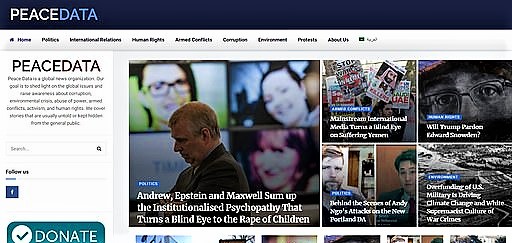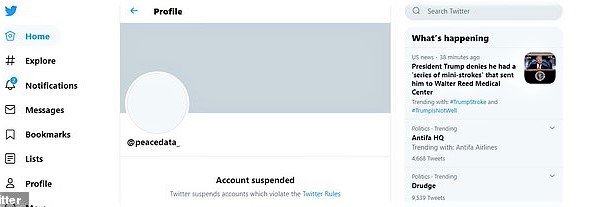Twitter and Facebook announced today they had suspended accounts linked to a Russian influence operation which posed as an independent news outlet to target left-wing voters in the United States and Britain.
The accounts were linked to a website named Peace Data, which allegedly hired freelance journalists to write about domestic politics as part of the manipulation scheme.
The operation is believed to have partly focused on US politics and racial tensions in the run-up to the November 3 presidential election.
Social media analytics firm Graphika reported that part of the operation’s aim was to steer left-wing voters away from Joe Biden’s campaign.
Twitter announced it had suspended five accounts linked to the operation as it slammed governments attempts to ‘undermine democracy’.
Peace Data also operated 13 Facebook accounts and two pages, which were set up in May and suspended on Monday for using fake identities and other forms of ‘coordinated inauthentic behavior,’ the company said.
The investigation began based on information from the FBI about its off-Facebook activities.
Facebook said its investigation ‘found links to individuals associated with past activity by the Russian Internet Research Agency’, a St Petersburg-based company, known as a ‘troll factory’, which U.S. intelligence officials say was central to Russian efforts to sway the 2016 presidential election.
Moscow has denied those allegations and says it does not interfere in the domestic politics of other countries.
Investigators at social media analytics firm Graphika studied the operation and said Peace Data predominately targeted progressive and left-wing groups in the United States and Britain, but also posted about events in other countries including Algeria and Egypt.
It said in a report that the website pushed messages critical of right-wing voices and the center left, and in the United States ‘paid particular attention to racial and political tensions’, including civil rights protests and criticism of President Donald Trump and his Democratic rival, Joe Biden.
Graphika said only around 5 percent of Peace Data’s English-language articles directly concerned the US election, but that ‘this facet of the operation suggests an attempt to build a left-wing audience and steer it away from Biden’s campaign.’
The findings support an assessment by the United States’ top counterintelligence official last month, who said Moscow was using online disinformation to try to undercut the Biden campaign, and could stoke fears about further Russian efforts to interfere in the November vote.
Facebook’s head of cybersecurity policy, Nathaniel Gleicher, said his team acted on information provided by the FBI and suspended the accounts before they gathered a large online following.
Only 14,000 people followed one or more of the suspended accounts, he said.
‘I think it’s very important that we know about this,’ Gleicher told Reuters. ‘I want people to know that Russian actors are still trying and their tactics are evolving, but I wouldn’t want people to think that this was a large, successful campaign.’
Twitter said that tweets from the accounts also had low impact on the platform but warned they would still strictly enforce their policies against ‘attempts to manipulate our service to undermine democracy’.
They added that they worked alongside the FBI in identifying and suspending the accounts to ‘protect the public conversation’.
‘We wish to express our gratitude to the @FBI’s Foreign Influence Task Force for their close collaboration and continued support of our work to protect the public conversation at this critical time,’ Twitter Safety announced Tuesday.
‘Regardless of the low-level impact in this case, governments around the world must stop these practices. They’re antidemocratic.
‘Attempts to manipulate our service to undermine democracy — by both foreign and domestic actors — will be met with strict enforcement of our policies,’ the company added.
Twitter stated that the five accounts will now be included in the company’s database of information operations to empower academic research.
‘The accounts purported to be associated with a website called Peace Data, which publishes a range of content about global political issues,’ Twitter said.
‘At least some of the content published on the website was created by real people who appear to have contributed to Peace Data as freelancers.
‘The Tweets from the Russian-linked accounts were low quality and spammy, and most Tweets from these accounts received few, if any, Likes or Retweets. The accounts achieved little impact on Twitter and were identified and removed quickly,’ the statement continued.
‘Going forward, links to content from Peace Data’s site will be blocked from being shared on our service. Existing links will be de-amplified across the service in accordance with our policies.’
Peace Data publishes in English and Arabic and says on its website it is a non-profit news organisation seeking ‘the truth about key world events’.
But the three permanent staff listed online are not real, according to the Graphika analysis, which found the profiles used computer-generated photographs of non-existent people and were linked to fake accounts on Facebook, Twitter and business-networking site LinkedIn.
To evade detection, the people behind the network recruited Americans to do their bidding, likely unknowingly, both as journalists and as people authorized to purchase political advertisements in the U.S.
The fake personas advertised for writers on freelance journalism websites and Twitter, offering up to $75 for an article, screenshots of the adverts seen by Reuters showed.
Peace Data’s website lists 22 ‘contributors’, mostly freelance journalists in the United States and Britain. Facebook and Graphika said there was no indication the writers knew who was behind the website.
Peace Data ‘staff’ then shared the articles, covering a wide range of political issues, in left-wing social media groups, Graphika said.
The website published over 700 articles in English and Arabic between February and August this year.
Ben Nimmo, head of investigations at Graphika, said co-opting real people made it easier for political influence operations to remain undetected.
‘What we’ve seen recently has been much smaller and much lower profile,’ he said. ‘It looks like they’re trying harder and harder to hide.’
It comes after Twitter in August unveiled new labels marking the tweets and accounts of ‘state-backed media’ as well as official government entities, in a move it said will ‘increase transparency and accountability.’
It announced the new steps to prevent the spread of content from state-affiliated media used to advance a government’s political agenda, a move affecting key outlets from Russia and China.
Official government accounts, such as the White House, and key government officials tasked with communicating foreign policy abroad will also receive the labels.
Twitter said the changes will for now only be applied to the five permanent members of the UN Security Council, which are the US, the UK, France, Russia and China.
It added that it would define state-backed media outlets as ‘outlets where the state exercises control over editorial content through financial resources, direct or indirect political pressures, and/or control over production and distribution.’
‘Unlike independent media, state-affiliated media frequently use their news coverage as a means to advance a political agenda,’ the company said in a statement.
Already, the label has been applied to a number of Russian outlets, including RT and Sputnik, as well as Chinese news services such as China Daily and Xinhua.
Top editors and senior staff at the designated news outlets will also receive the label on their tweets, Twitter said.
Twitter said the decision would not affect ‘state-financed media organizations with editorial independence,’ specifically citing the British-based BBC and US-based National Public Radio.
Twitter’s announcement follows a similar action by Facebook earlier this year which labeled content from media which are editorially controlled by governments.
It follows increasing tension over Twitter’s role as an arbiter of public debate, after bitter spats between the social media site and President Donald Trump.
In recent months, Twitter has moved aggressively to slap fact-checking labels and warnings on certain of Trump’s tweets, and this week even removed a video of the president claiming that children are ‘almost immune’ to coronavirus, calling it medical misinformation.
In fact, children are not immune to the virus, but appear to suffer serious side affects and mortality at a dramatically lower rate than older individuals.
It also comes amid concerns over campaigns by governments aimed at influencing elections and public sentiment in other countries through media outlets that disguise their true origins.
State-led influence campaigns were prominent on social media during the 2016 US elections and have been seen around the world.
On August 12, Twitter also announced that it was joining with Facebook, Reddit, LinkedIn and others to ‘counter shared threats to the online public conversation ahead of the 2020 US Elections’.
‘We continue to stay vigilant on these issues and meet regularly ahead of the November election,’ they said in a joint statement.

